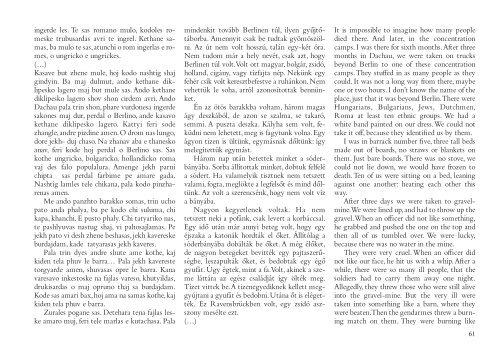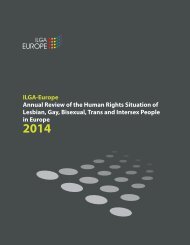Create successful ePaper yourself
Turn your PDF publications into a flip-book with our unique Google optimized e-Paper software.
ingerde les. Te sas romano mulo, kodoles ro -<br />
meske trubusardas avri te ingrel. Kethane sa -<br />
mas, ba mulo te sas, atunchi o rom ingerlas e ro -<br />
mes, o ungricko e ungrickes.<br />
(…)<br />
Kasave but zhene mule, hoj kodo nashtig shaj<br />
gindyin. Ba maj dulmut, ando kethane diklipesko<br />
lagero maj but mule sas. Ando kethane<br />
diklipesko lagero shov shon cirdem avri. Ando<br />
Dachau pala trin shon, phare vurdonesa in gerde<br />
sakones maj dur, perdal o Berlino, ande ka savo<br />
kethane diklipesko lagero. Kattyi feri sod e<br />
zhangle, andre pizdine amen. O drom nas lungo,<br />
dore jekh- duj chaso. Na zhanav aba e thanesko<br />
anav, feri kode hoj perdal o Berlino sas. Sas<br />
kothe ungricko, bolgaricko, hollan dic ko roma<br />
vaj des falo populalura. Amenge jekh parni<br />
chipta sas perdal farbime pe amare gada.<br />
Nashtig lamles tele chikana, pala kodo pinzha -<br />
renas amen.<br />
Me ando panzhto barakko somas, trin ucho<br />
pato anda phalya, ba pe kodo chi suluma, chi<br />
kapa, khanchi. E pusto phaly. Chi tatyariko nas,<br />
te pashlyuvas nastug shaj, vi pahosajlamas. Pe<br />
jekh pato vi desh zhene beshasas, jekh ka ve reske<br />
burdajdam, kade tatyarasas jekh kaveres.<br />
Pala trin dyes andre shute ame kothe, kaj<br />
kiden tela phuv le barra… Pala jekh kavereste<br />
torgyarde amen, shuvasas opre le barra. Kana<br />
va resavo inkestoske na fajlas vareso, khutyildas,<br />
dru kisardas o maj opruno thaj sa burdajdam.<br />
Ko de sas amari bax, hoj ama na samas kothe, kaj<br />
kiden tela phuv e barra.<br />
Zurales pogane sas. Detehara tena fajlas les -<br />
ke amaro muj, feri tele marlas e kutachasa. Pala<br />
mindenkit tovább Berlinen túl, ilyen gyûjtô -<br />
táborba. Amennyit csak be tudtak gyömöszölni.<br />
Az út nem volt hosszú, talán egy-két óra.<br />
Nem tudom már a hely nevét, csak azt, hogy<br />
Berlinen túl volt. Volt ott magyar, bolgár, zsi dó,<br />
holland, cigány, vagy tízfajta nép. Nekünk egy<br />
fehér csík volt keresztbefestve a ruhánkon. Nem<br />
vehettük le soha, arról azonosítottak bennünket.<br />
Én az ötös barakkba voltam, három magas<br />
ágy deszkából, de azon se szalma, se takaró,<br />
sem mi. A puszta deszka. Kályha sem volt, fe -<br />
küd ni nem lehetett, meg is fagytunk volna. Egy<br />
ágyon ti zen is ültünk, egymásnak dôltünk: így<br />
mele gí tettük egymást.<br />
Három nap után betettek minket a sóderbányába.<br />
Sorba állítottak minket, dobtuk felfelé<br />
a só dert. Ha valamelyik tisztnek nem tetszett<br />
va lami, fogta, meglökte a legfelsôt és mind dôl -<br />
tünk. Az volt a szerencsénk, hogy nem volt víz<br />
a bányába.<br />
Nagyon kegyetlenek voltak. Ha nem<br />
tetszett ne ki a pofánk, csak levert a korbáccsal.<br />
Egy idô után már annyi beteg volt, hogy egy<br />
éjszaka a katonák hordták el ôket. Állítólag a<br />
sóderbányába dobálták be ôket. A még élôket,<br />
de nagyon betegeket bevitték egy pajtaszerû -<br />
ségbe, leszapulták ôket, és bedobtak egy égô<br />
gyufát. Úgy égtek, mint a fa. Volt, akinek a sze -<br />
me láttára az egész családját így ölték meg.<br />
Tízet vittek be. A tizenegyediknek kellett meggyújtani<br />
a gyufát és bedobni. Utána ôt is elégették.<br />
Ez Ravensbrückben volt, egy zsidó asz -<br />
szony mesélte ezt.<br />
(…)<br />
It is impossible to imagine how many people<br />
died there. And later, in the concentration<br />
camps. I was there for sixth months. After three<br />
months in Dachau, we were taken on trucks<br />
beyond Berlin to one of these concentration<br />
camps. They stuffed in as many people as they<br />
could. It was not a long way from there, maybe<br />
one or two hours. I don’t know the name of the<br />
place, just that it was beyond Berlin. There were<br />
Hungarians, Bulgarians, Jews, Dutchmen,<br />
Roma at least ten ethnic groups. We had a<br />
white band painted on our dress. We could not<br />
take it off, because they identified us by them.<br />
I was in barrack number five, three tall beds<br />
made out of boards, no straws or blankets on<br />
them. Just bare boards. There was no stove, we<br />
could not lie down, we would have frozen to<br />
death. Ten of us were sitting on a bed, leaning<br />
against one another: heating each other this<br />
way.<br />
After three days we were taken to gravelmine.<br />
We were lined up, and had to throw up the<br />
gravel. When an officer did not like something,<br />
he grabbed and pushed the one on the top and<br />
then all of us tumbled over. We were lucky,<br />
because there was no water in the mine.<br />
They were very cruel. When an officer did<br />
not like our face, he hit us with a whip. After a<br />
while, there were so many ill people, that the<br />
soldiers had to carry them away one night.<br />
Allegedly, they threw those who were still alive<br />
into the gravel-mine. But the very ill were<br />
taken into something like a barn, where they<br />
were beaten. Then the gendarmes threw a burning<br />
match on them. They were burning like<br />
61



